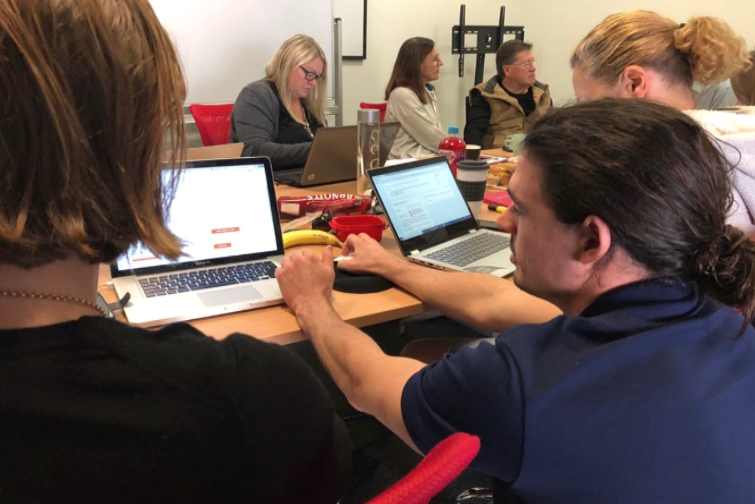The multi-billion dollar startup sector is bouncing back – 8 big trends will shape 2025
- Written by Rod McNaughton, Professor of Entrepreneurship, University of Auckland, Waipapa Taumata Rau

Startups have always been at the forefront of innovation[1]. But factors such as artificial intelligence (AI), sustainability and decentralisation are set to reshape industries in 2025.
Businesses are defined as startups when they are in the initial stages of development. They are characterised by the potential for rapid growth and external funding. And they are also sensitive to economic shifts and investment uncertainty.
For Australia and New Zealand, startups play an important role in overcoming geographic and market constraints. They can also help address both countries’ persistent productivity challenges[2].
Industry body Startup Genome[3] estimates Sydney’s startup ecosystem was worth US$72 billion in 2024 with more than 3,000 startups. New Zealand’s ecosystem is valued at $9 billion across 2,400 startups.
Both Australia and New Zealand have weathered global challenges such as recent slowdowns in investment activity[4] when startups struggled to secure funding.
But venture investments in both countries recovered well in 2024 compared to elsewhere. And the outlook for 2025 is cautiously optimistic[5].
Global trends in 2025
As global trends reshape industries, local startups could take the lead. Here are eight key trends set to define their path in 2025.
Generative AI: driving creativity and efficiency
Generative AI[6] – a type of artificial intelligence technology that can produce text, images and audio – helps firms to automate complex tasks, create personalised user experiences and lower costs.
The challenge will be to balance rapid innovation with ethical considerations around data privacy, bias and environmental impact.
Businesses that demonstrate transparency and accountability are more likely to stand out in an increasingly competitive field.
Sustainability: a competitive advantage
Sustainability has evolved from a compliance requirement to a strategic benefit[7].
Globally, carbon capture and green technology are attracting record investments[8]. Sustainability drives some of the most innovative solutions in Australia and New Zealand, where climate resilience is a critical issue.
The rise of sustainable startups aligns with growing consumer expectations[9] and government incentives[10].
Health tech: the personalisation revolution
Health tech is undergoing a profound shift, moving from reactive care to proactive, personalised solutions[11].
In 2025, personalisation will continue to influence healthcare. Startups using AI and data analytics to improve outcomes and accessibility are likely to see growth.
Remote work evolution
The shift to remote and hybrid work has reshaped business operations worldwide. This is particularly the case in the aftermath of the global pandemic.
Tools that enhance productivity and enable startups and big companies alike to build global teams will help businesses access talent across borders.
Decentralisation: blockchain beyond cryptocurrency
Blockchain technology is moving beyond its roots in cryptocurrency and is now integral to transparency, efficiency and data security.
Decentralised applications[12], which run on blockchain technology and rely on peer-to-peer networks, are changing how businesses do things in areas like finance, healthcare and entertainment.
Space tech: scaling the final frontier
Space technology is no longer the exclusive domain of government agencies. Startups such as New Zealand’s Rocket Lab are increasing access to space.
Australian company Fleet Space Technologies is deploying nanosatellites to improve connectivity in remote industries like mining and agriculture.
Diversity in funding and leadership
Globally, funding disparities remain a challenge for underrepresented groups in entrepreneurship, including women, Indigenous peoples and minority communities.
Startups led by these groups often receive a fraction of the funding allocated to their counterparts, limiting their ability to scale and compete.
Female-led startups, for example, attract less than 3% of venture capital[13]. Indigenous and minority entrepreneurs frequently face unique barriers such as limited access to networks and culturally tailored support.
Programs designed to address these inequities can play an transformative role. These initiatives include those aimed at women founders, offering mentorship, funding and business development resources. Similar programs for cultural groups providing funding and culturally aligned advisory services are also important.
In 2025, systemic barriers will continue to attract attention, with increasing demands for startups to be more diverse and inclusive.
Alternative financing models
In the face of a continuing economic downturn, startups will likely continue to explore alternative financing models to fund growth without sacrificing significant equity.
Traditional venture capital often leaves gaps, especially for early-stage ventures or those in underserved sectors.
Bootstrapping, where founders self-fund and grow sustainably, continues to be a cornerstone for many entrepreneurs. However, crowdfunding platforms are evolving rapidly. Other options allow startups to engage directly with their communities and raise significant capital while building customer loyalty.
In 2025, new fintech developments and AI-driven platforms could streamline access to grants, loans and investment opportunities, making funding faster and more accessible.
These changes are set to expand the range of options for founders, reducing reliance on traditional venture capital and creating a more inclusive and dynamic funding ecosystem.
Startups as catalysts for change
Startups will continue to experience greater than usual uncertainty and must navigate the complexities of 2025, tackling global challenges with local ingenuity.
They will continue to reshape industries and address critical economic and environmental issues, harnessing generative AI, advancing green technologies and innovating financing models.
However, to succeed, startups must prioritise inclusivity and support innovative funding approaches to ensure broad-based participation in technology-driven growth.
References
- ^ forefront of innovation (journals.sagepub.com)
- ^ persistent productivity challenges (press-files.anu.edu.au)
- ^ Startup Genome (startupgenome.com)
- ^ recent slowdowns in investment activity (focusonbusiness.eu)
- ^ outlook for 2025 is cautiously optimistic (www.cambridgeassociates.com)
- ^ Generative AI (www.techtarget.com)
- ^ compliance requirement to a strategic benefit (theconversation.com)
- ^ record investments (www.iea.org)
- ^ consumer expectations (hbr.org)
- ^ government incentives (www.iea.org)
- ^ proactive, personalised solutions (theconversation.com)
- ^ Decentralised applications (www.coinbase.com)
- ^ less than 3% of venture capital (www.forbes.com)

















